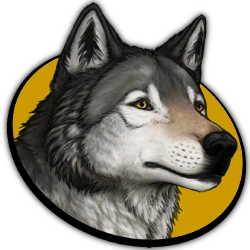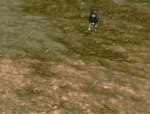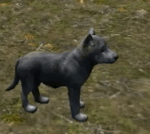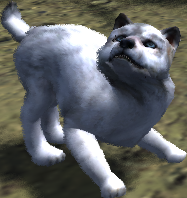Wolf pups are small and vulnerable predators introduced with the release of the second episode, Survival of the Pack.[1] The game will always generate four pups during the second episode or during multiplayer's co-op Raise Pups mode when spring arrives. They are one of two juvenile animals currently available in-game.
In scent vision, toggled by the V key, players can easily identify wolf pups by their brown scent trails.
Birth
Pups are not born until progress has been made in Slough Creek. Specifically, the player must first find a den for their pack and then mark their new territory. The game will then transition to spring, bringing with it the pack's first litter. Experience points play a small role in naming pups as well as the pelt color of the first-born pup.
The coat of a pup is either inherited from the parents or an ancestor; tints and gradients are also utilised, meaning no two pups will be exactly the same. Eye colors range from blue, grey, brown, amber and orange.
Responsibilities
As parents, the player and their mate are responsible for raising the litter, including training, feeding and protecting their offspring throughout the game.
Unlike the previous quest, episode two is divided into six missions. Guides are available in the User Guides- The Game section of the WolfQuest community forums and offered on the Wiki's guides article.
Behavior
Being young animals, pups are naturally inquisitive and curious about their surroundings. They will interact and play with their littermates, react to certain actions performed by players and the single player mate, and wander without straying too far from the den once affinity has been established. Pups are passive towards all NPCs. They do not flee when confronted by predators nor will they interact with or react to the presence of prey. Grizzly bears, coyotes, cougars and stranger wolves will target and attempt to kill pups if they wander into or spawn near the den site.
At this life stage they are unable to consume from food sources such as carcasses, so the player and their mate are tasked with bringing food back to the den after hunting or scavenging by way of regurgitation. Only then will they be able to eat. When cubs are hungry, they will follow the player and "beg," rearing up slightly and pawing at the player until they are fed.
Players can carry a pup, but its weight imposes a draining effect on stamina for as long as the pup is being carried. When stamina is exhausted, the pup will whine and the player will be forced to drop their offspring/young sibling. Every time a pup is fed, picked up and dropped close to the den, played or interacted with, experience is received.
Den
As of version 2.7, unsupervised pups will retreat into the safety of their den when all players are outside of and not within range of the pack's chosen territory. Their health will still gradually deplete over time and it is possible for the entire litter to die if the pack spends too much time away from their home.
Mortality
Like many other species' juveniles, gray wolves' offspring are weak and vulnerable in their first twelve weeks of life. One swipe, bite or a pair of strong talons is all it will take for them to die at the claws or jaws of another predator, so players are advised to be vigilant if their goal is for the entire litter to survive. A wolf pup split from its pack by an eagle has its fate sealed and will perish shortly after it has been carried away.
If a pup dies in any way -- starvation, drowning, predators, accidents or negligence -- its death is permanent and it will not respawn. Recovering a deceased pup requires either reloading a previous save or restarting the episode from the beginning.
Gallery
| Wolf pup (2.7) is currently under construction
The information contained within it should not be presently considered fully accurate and/or complete. You can help by contributing to it. |
Coat Variations
The following gallery displays all possible coat variations for pups. There are eleven possibilities:
Trivia
- There is a extremely rare glitch when one of the wolf pups strays away from the den. Not just the normal stray and rebound, a stray that prevents it from returning from the den on it's own. Should you follow, it seems to wander into stranger wolf territory without consequence of the pup itself, and without consequence to the adult wolf following; the stranger wolves don't seem to react at all.
- This was last seen happening in Slough Creek, somewhere before mission 5 when settled at East Creek.
- In WolfQuest, the pups' first days/week is skipped entirely, instead starting at approximately 3-4 weeks old. By the end of the second episode, pups are 8-10 weeks old.[2]
- Wolves are born with blue eyes, a true fact which is appropriately reflected in-game. Players' pups do have a small chance of having blue eyes, but they may also have yellow, amber, brown or green eyes. It's extremely rare for a wolf to still have green eyes as an adult and impossible for it to have blue eyes unless it is a wolf-dog or a leucistic.
- Pups are attracted to adult wolves if they have enough food to offer them; this is useful when pups are required to stay close by and to follow.
- Pups cannot swim; upon entering a deep body of water excluding the creek shallows, pups will begin to drown.
- Pups cannot hunt, though they do have an animation that resembles play hunting.
- Before birthing pups, the female wolf does not display signs of pregnancy, however a visible transition has been requested.[3]
- Although the game implies that the pups are safe "inside the den", they do not enter the den/another zone or leave the Slough Creek map. They will lie and remain stationary outside the den until at least one player has returned. The den itself remains a non-functional cosmetic object.
- Players are not able to enter the den. This is due to the interior being a very small and cramped environment.[4]
- East Creek is the only exception.
- Players are not able to enter the den. This is due to the interior being a very small and cramped environment.[4]
- Like all other NPCs, pups are controlled by AI.
- Pups' hide-in-den behavior makes it possible for the mate to resume its follow-and-assist behavior. From 2.0-2.5, the mate would stay at the den with the pups, making hunting tasks much difficult.
- Contrary to popular belief, the pure white puppy is not albino. Albinism has not yet been seen and verified in wild wolves, so it's most likely extremely difficult to come across. Plus, true albinos have red/pink eyes due to lack of pigment. There are some notable differences with the pure white pup and the regular white pup which can be used to easily differentiate between the two.
- Pups do not currently have (or inherit) any stats.




























